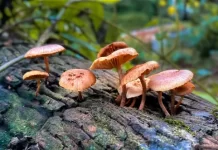Gymnema Sylvestre is a plant known in Ayurvedic medicine. It is associated with better metabolic health. Why is it recommended? What are its contraindications? Read on!
The Gymnema Sylvestre is a woody climbing shrub that belongs to the family Apocynaceae. It comes from the tropical forests of India, Africa, and Australia. Its leaves are well known in Ayurveda medicine and is also called Gur-Mar, a Hindi term that means “destroyer of sugar”.
As indicated in a publication of the Journal of Clinical Biochemistry and Nutrition, this plant contains gymnemic acids with hypoglycemic effects.
On top of that, it reduces the risk of heart disease and helps maintain a healthy weight. Read on to learn more about the properties of this plant.
Property of Gymnema Sylvestre
Gymnema Sylvestre- based supplements have spread all over the world. Thanks to its composition, the plant has attracted the attention of Western medicine; in fact, it has been the subject of studies.
It is not considered a first-choice treatment, but its potential as an adjuvant against some health problems is now recognized.
A study published in Frontiers in Pharmacology illustrates the composition of the plant, which includes chemical compounds of great therapeutic importance, such as stigmasterol and triterpenoid saponins. These, in particular, give it the following properties:
- Hypoglycemic.
- Antioxidant.
- Antitumor.
- Antifungal.
- Hepatoprotective.
Benefits of Gymnema Sylvestre


The main bioactive compounds of Gymnema Sylvestre are gymnemic acids. These, along with phenolic compounds, saponins, and anthraquinones, give it a wide variety of positive health effects. Below we will illustrate the most relevant.
Also Read: Complete Stretching Routine: Which Exercises?
Reduces the craving for sugar
The Gymnema Sylvestre reduces sugar cravings. According to a study released in Physiology & Behavior, this effect is due to gymnemic acids that block the sweetness receptors in the taste buds.
What has just been said is of great help for those who always want to consume sugary foods. Taking the extracts of this shrub before meals makes sweets less tempting.
It stimulates the release of insulin
The main subject of study is the role of this plant in the presence of conditions such as diabetes and metabolic syndrome. In this regard, a study published in Diabetes, Obesity, and Metabolism explains that it is an adjuvant in the release of insulin by the pancreas.
Also Read: Warm-up exercises to do at home
Specifically, its extracts promote cell regeneration of pancreatic islets, which are responsible for producing this hormone. As a result, glucose levels drop and health improves. However, more research is needed on this.
Regulates glucose levels
The Gymnema Sylvestre has hypoglycemic effects. This means that its consumption lowers high blood sugar levels. Furthermore, it has been used together with medicines to enhance their effects.
In addition to stimulating the release of insulin, it also helps to block the receptors in the intestine, preventing the absorption of glucose. According to a study published in Current Pharmaceutical Design, it is necessary to take between 200 and 400 milligrams of gymnemic acid to reduce the intestinal absorption of sugar.
If you are taking medications to lower glucose levels, consult your doctor before taking these supplements. Further studies are currently needed to evaluate these effects, as well as doses and efficacy.
Anti-inflammatory activity
The tannins and saponins present in the Gymnema leaves are anti-inflammatory. In fact, the extracts of the plant are used as adjuvants for inflammatory conditions, such as diabetes, heart, and autoimmune diseases.
Promotes weight loss
It is not a miracle remedy to lose weight overnight, but the consumption of Gymnema extracts is associated with a reduction in the body mass index.
In a study published in Diabetes, Obesity, and Metabolism we read that people who take this supplement see a 5% reduction in their body weight.
Similarly, subjects with moderate obesity are induced to eat less, therefore they have a lower presence of lipids in the blood.
Protects cardiovascular health
Consuming the extracts of this plant also has a positive effect on cardiovascular health. To be more precise, they are useful in regulating the lipid profile.
In the research published in Diabetes, Obesity, and Metabolism it is shown that Gymnema is useful for lowering triglycerides and bad cholesterol (LDL) in obese patients, in 20.2% and 19% respectively. We can therefore say that it reduces the risk of cardiovascular disease.
Contraindications of Gymnema sylvestre
For most healthy adults, Gymnema Sylvestre is considered safe as long as its consumption is moderate. However, due to the lack of evidence on its safety, it is contraindicated in the following cases:
- Pregnancy and breastfeeding.
- Children and babies.
- Patients with diabetes who are taking medicines (unless their doctor tells them to).
- People who will be undergoing surgery soon.


Although side effects are rare, they can occur as a result of a sharp drop in blood sugar levels. These include:
- Headache.
- Dizziness
- Instability.
- Nausea.
How to consume Gymnema Sylvestre?
There are currently Gymnema Sylvestre supplements in powder or capsule form. In addition, its leaves are available for the preparation of infusions. The recommended dose depends on the presentation chosen and the manufacturer, but generally:
- 100-milligram capsules: 3 or 4 times a day.
- A cup of infusion 2 times a day.
- 2 grams in powder or 4 grams if there are no adverse reactions.
What to remember about this plant?
In Ayurvedic medicine, Gymnema Sylvestre is appreciated because it is able to regulate glucose levels and reduce the risks associated with metabolic syndrome.
However, it is not considered a first-choice treatment for diabetes. It should be taken in moderation and under medical supervision.
Although some studies support its medicinal properties, it cannot replace conventional treatments. Simply, if the doctor authorizes it, it can be a valid supplement to promote well-being!














